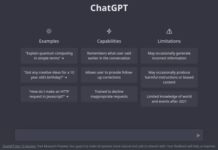By James D. Agresti
The State of New Jersey recently enacted a law that requires K–12 students to learn “information literacy.” Stated plainly, this is the skills to determine what’s true and what’s not. The law is allegedly the first of its kind in the nation.
The sentiment behind the legislation is admirable, but the law itself is vague and gives the NJ Department of Education broad authority to create these standards. Given the track record of the U.S. education establishment, this could be an epic mistake.
To wit, the latest adult skills assessment by the U.S. Department of Education found that only 37% of U.S. residents aged 16 to 65 years can correctly answer a question requiring basic logic, addition, and division. This is in spite of the fact that they were allowed to use a calculator and take as much time as needed.
Even among college graduates, empirical assessments show a troublesome lack of analytical and problem-solving skills. When the American Institutes for Research last assessed the literacy skills of graduating college students in 2003, it found that only 39% of males and 30% of females at 4-year colleges were proficient in quantitative literacy. This is simply the ability to “identify and perform computations” using “numbers embedded in printed materials,” such as “balancing a checkbook, figuring out a tip, completing an order form, or determining the amount of interest on a loan from an advertisement.”
Worse still, repeated scientific surveys commissioned by Just Facts have revealed that the “vast bulk of voters have embraced false and harmful dogmas that accord with their political views.” The same is true of journalists and editors at media outlets like the New York Times, who regularly publish falsehoods that spur violence and civic dysfunction.
To attack this problem at its root, Just Facts has launched an initiative to equip people with the skills to conduct sound research. Called Just Facts Academy, it provides videos and other educational materials that motivate and teach students of all ages how to separate fact from fiction.
These videos are created especially for high school and college students, and thus, they are laced with humor to keep them engaged. To ensure the videos are rigorous, comprehensible, and entertaining, Just Facts sought feedback from students and reviews from scholars, who expressed high opinions of their appeal and utility.
In addition to students, Just Facts Academy also serves a need of the general public that has grown dramatically in the wake of the Covid-19 pandemic. A large international survey conducted in 2020 found a massive shift in the desire of people to become more prudent consumers of news. It revealed that “trust in all information sources” was “at record lows,” and more than 50% of people said “it has become more important” to increase “my media and information literacy” and “my science literacy” over the previous year.
Just Facts is in an ideal position to help people tackle this formidable task because it has developed exacting standards to produce research that has been cited by a diverse array of prominent and scholarly organizations and individuals.
Beyond that, Just Facts is consistently ahead of the curve on cutting through widespread misinformation. For a prime example, Fox Business published a stunning article documenting how Just Facts “preempted media reporting and public health officials” on Covid-19 “almost a dozen times.” This includes life-or-death facts they once denied and have now accepted, such as those related to lockdowns, masking, mRNA vaccines, naturally acquired immunity, and the most effective way to protect vulnerable populations from SARS-CoV-2.
Much of this research was conducted by adhering to universal principles that Just Facts Academy has distilled into nine short videos. One of these, for example, teaches in only six minutes how to identify and use primary sources.
Another video teaches the import and know-how of conducting comprehensive research. Using a real-world example about climate change, the video vividly shows, “Things aren’t always as cut and dry as they seem at first glance. So when we research, it’s important to understand the points, counterpoints and limitations.”
Other videos cover crucial research topics like rigorous documentation, raw data, verification, clarity, balance, reducing distractions, and how to sort through the propaganda presented by search engines.
To entrench the learning from these videos, Just Facts Academy also provides Genius Notes that allow people to quickly consult and apply these skills on an ongoing basis.
Going forward, Just Facts Academy will create videos about dozens of other topics, with tools to help people use this knowledge in everyday life. This includes subjects like identifying the strengths and weaknesses of academic studies, evaluating the credibility of polls, and spotting deceptive statistics.
David Randall of the National Association of Scholars recently documented how radical leftists have advanced their agenda with “half-baked research, eagerly cited and repeated until much of public opinion takes it as some sort of proven truth.” Among his proposed solutions are equipping students to “recognize when so-called experts ask them to believe shoddy research” and creating “new programs in statistics and public policy, independent of the existing higher-education establishment.”
Filling those gaping holes in the U.S. education system is a tall order, but this is precisely what Just Facts Academy is primed to do.
However, all of this knowledge will be useless unless people learn and apply it. So it is imperative that teachers, professors, home-school parents, school board members, and university regents make these badly neglected research principles an integral part of their curriculums.
James D. Agresti is the president of Just Facts, a research institute dedicated to publishing facts about public policies and teaching research skills.
Just Facts is a non-profit institute dedicated to publishing comprehensive, straightforward, and rigorously documented facts about public policy issues. To accomplish this with objectivity and excellence, we use exacting Standards of Credibility to determine what constitutes a fact and what does not. The vision of Just Facts is to equip people with facts that empower them to make truly informed decisions about important matters. This requires proven facts that accurately and fully convey reality—not pseudo-facts, half-truths, or talking points.



















